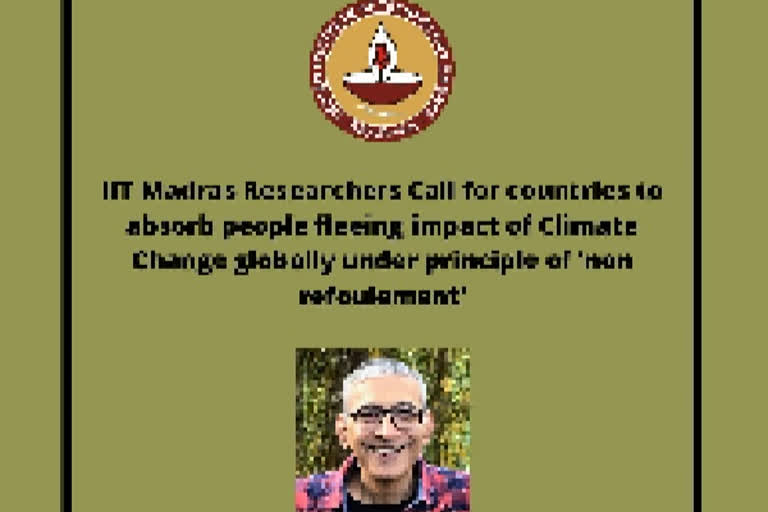Chennai: Indian Institute of Technology ((IIT)-Madras researchers have suggested a normative framework to address cross-border migration due to climate change. With climate change intensifying the push to migrate, the researchers have suggested that all asylum seekers have to be absorbed into host countries under the principle of non-refoulement. This will ensure that refugees are not forced to return to their home countries to face harm.
Also, asylum seekers from vulnerable zones must be absorbed in host countries in proportion to their greenhouse gas emissions. The researchers conclude that given the severity of the anticipated global environmental changes and associated harms, taking early and appropriate action is vital. However, the question ‘did this person migrate because of climate change?’ may never be answered.
This issue was taken up by Prof Sudhir Chella Rajan, Department of Humanities and Social Sciences, IIT Madras, and Dr Sujatha Byravan, an independent scholar, who has published a research paper titled ‘Cross border migration on a warming planet: A policy framework.’ They propose a normative framework with responses to address cross-border migration. The paper was published in the reputed peer-reviewed journal WIRES Climate Change.
Read: Climate change making extreme heat waves in India 100 times more likely: Study
Speaking about the need for such research, Prof Sudhir Chella Rajan, Department of Humanities and Social Sciences, IIT Madras, said, “In recent years, the increased risks of environmental hazards, including climate change, have intensified the push to migrate. One such case is the teeming slums of Bangladesh’s capital Dhaka where the residents are on the frontlines of a climate crisis. People living along the coast have been migrating to the Bangladeshi capital due to monsoon flooding and cyclones caused by rising sea levels. For these residents, the worsening climate change is not a faraway threat. It is a grim reality.”
Furthermore, Prof Sudhir Chella Rajan, Department of Humanities and Social Sciences, IIT Madras, said, “Climate scientists have known for more than a decade that tens of millions of people, if not more, will be forcibly displaced from some of the poorest countries as a result of climate change. If their countries are no longer viable homes through no fault of their own, the international community has a moral responsibility to provide refuge.”
Elaborating on the need for such research, Dr Sujatha Byravan, co-author of this research and an independent scholar, said, “There is an urgent need to ensure that people from countries that have emitted very little greenhouse gases are not left fending for themselves. Climate exiles or migrants have no legal standing. These are the kinds of issues that ought to be addressed in the climate negotiations track of loss and damage under non-economic losses.”



